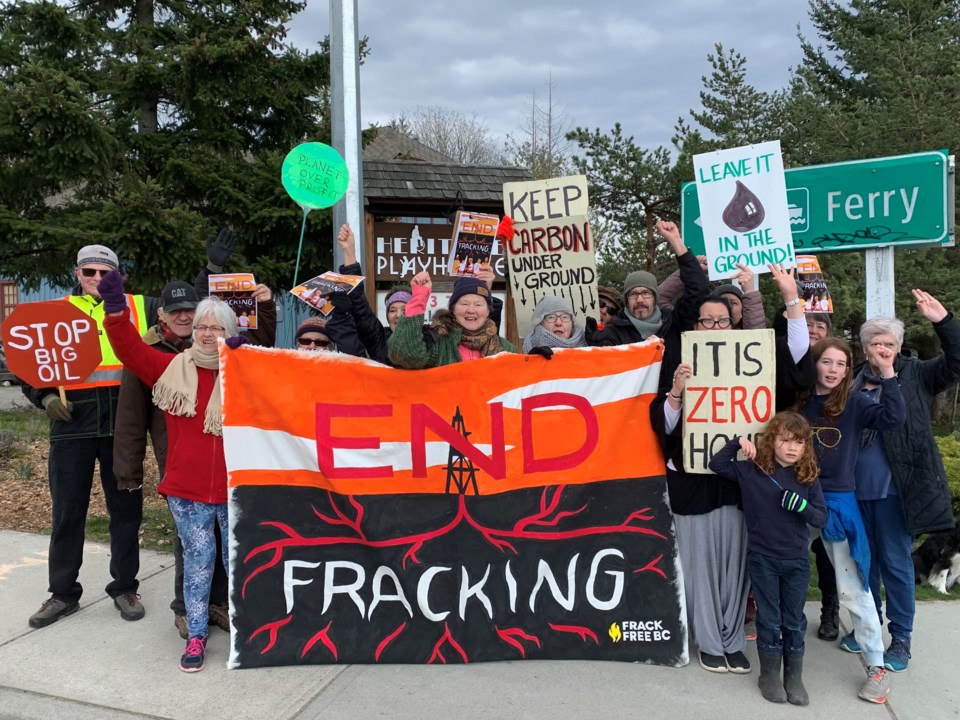Around 20 individuals opposed to hydraulic fracturing or “fracking” in B.C.’s natural gas industry spent an hour waving signs highlighting their concerns at Gibsons Way and North Road on March 26. Their presence was part of actions by more than 100 groups across the province supported by Frack Free BC.
That alliance of organizations and individuals wants Premier David Eby to protect the environment with a stop to new permits for gas wells, by setting a date to phase out existing production, and a plan to support workers and communities in transition to a sustainable economy.
Seeking change to ‘keep gas in the ground”
“The focus of this action was to highlight fracked gas as BC’s biggest climate problem,” event spokesperson and attendee Alexandra Woodsworth, told Coast Reporter. She said the local information picket was attended by “five year olds to retirees and grannies. A multi-generation action for sure, that included families, people who knew each other and some that didn’t. The people there were primarily concerned about climate change and aware that we can’t tackle it if we keep expanding fossil fuels and in particular new fracking wells, pipelines and LNG terminals and that is what the province is planning to do.
“For far too long this (fossil fuel extraction) has been something that was viewed as out of sight, out of mind. It’s been too easy for people in other parts of the province to not necessarily shine a spotlight on it. However, our most significant climate problem in B.C. is expanding gas production. The climate impacts from this are significant and they are going to head back to all of us. On the Coast, we are experiencing the impacts of climate change in terms of droughts and flood and fires, so it's an issue that affects all of us. Just because the work to suck the gas out of the ground happens elsewhere, this is something everyone in B.C. should be taking action on.
“The provincial decisions makers hold the keys to make change on this issue, to keep gas in the ground and so therefore they need to hear from people across the province.”
Actions to continue
Woodsworth indicated that Frack Free BC organizers, which include DogwoodBC, the Wilderness Committee and stand.earth, are planning for future actions to further their cause, with the next local event likely to happen in June. Those interested in learning more about the campaign or joining in future actions are invited to join Frack Free BC‘s next online welcome call on Monday, April 3, by visiting dogwoodbc.ca/petitions/frack-free-bc-april-organizing-call.
“To see change, we need to grow this movement," she said.
Province’s position
A BC government factsheet on fracking states that the practice is safe and subject to stringent regulations.
On March 14, a press release from the province detailed a new energy action framework aimed at ensuring oil and gas sector projects fit within B.C.’s climate commitments. It committed to require proposed LNG facilities have plans for net zero greenhouse gas emissions by 2030. A regulatory emissions cap for the oil and gas industry was promised, along with establishment of a clean-energy and major projects office to fast track clean energy investments and a BC Hydro task force to accelerate the electrification of B.C.’s economy.
On that same date, the province announced issuance of the environmental assessment certificate for the Cedar LNG project in northwestern British Columbia. A provincial press release on that action noted that project still required federal approvals and provincial permits and authorizations before construction. The proposal would see an electrified floating liquefied natural gas (LNG) facility and marine export terminal in Kitimat built on Haisla Nation-owned land, to be supplied with natural gas from the Coastal GasLink pipeline which remains under construction.



